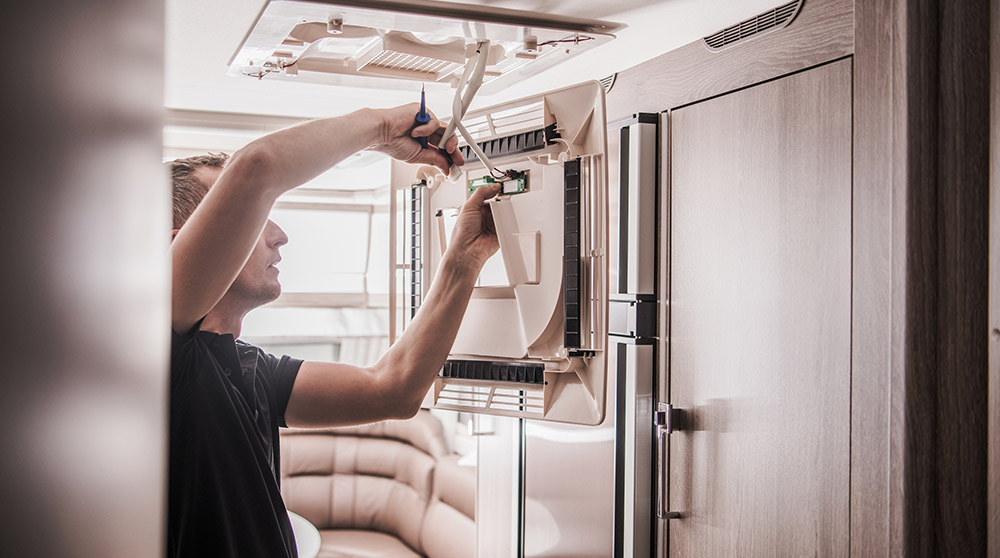According to the United States Census Bureau, the RV industry has been steadily growing for years. And today, more than 9 million American households have a recreational vehicle. If you’re one of the many enthusiasts who heard adventure calling your name, Frankenmuth Insurance is here to help you navigate the coverage you need to enjoy your next camping trip. Our RV checklist can help you de-winterize your vehicle and get your ride ready for the spring and summer seasons.
Before you go exploring, review our RV checklist:
- Check the tires. While sitting in storage, your RV tires will likely lose two to three psi (pounds per square inch) — even more if they’re stored somewhere cold. To get your ride ready for the road, check the air pressure in all the tires, including the spare. Then, reinflate them to match the manufacturer’s recommendation. Consult your owner’s manual, if necessary.
- Check the fluid levels. Are your fluids full and fresh? Now is the time to check. Take a look at the transmission fluid, power steering fluid, engine coolant, engine oil, windshield washer fluid, brake fluid and generator oil, and top off any fluids that are at a low level. If you don’t feel comfortable doing this yourself, have your RV serviced by a certified mechanic.
- Check the lights and controls. Start the engine to check for accurate readings on all gauges, as well as operational dashboard lights, headlights, taillights and windshield wipers.
- De-winterize your water system. To prepare your RV for winter and prevent frozen pipes, you probably added non-toxic antifreeze to the water system. Now, it’s time to flush the system to make sure your water is safe for cooking, drinking, washing dishes and showering. To get started, attach your clean water hose to your city water/garden tap and your RV’s clean water intake connection. Next, open the gray tank, turn on all faucets in your RV’s sinks and shower, and allow the water to run through the system for several minutes until it looks and tastes clean. Then, do the same for your holding tank. Turn the pump on and run it to flush out any residual antifreeze. To protect the environment, it’s inadvisable to flush these liquids into a sewer or drain. Some automotive service stations/part stores can safely dispose of the liquid. Others can give it to the recyclers for you for a small fee. Look into these options before you start. Remember not to get discouraged. We promise, this is the most time-intensive step of our RV checklist.
- Check for leaks. After de-winterizing your water system, take a look around the toilets, sinks and storage compartments. If you locate a leak, repair it as soon as possible.
- Change the filters. To improve efficiency and save energy, replace your air and water filters. Be sure to purchase the correct size, as filters should fit snugly to block dirt and bacteria.
- Replace propane tanks. If your RV uses propane, you’ll need to reinstall and refill the tank(s), then make sure all gas-fired appliances are in working order. You can do this by opening the gas line and testing each appliance. Before testing the hot water heater, fill it.
- Check the safety devices. Before your first outdoor adventure, change the batteries in your RV’s smoke alarm and carbon monoxide detector. Then, check the expiration date on your fire extinguisher and promptly replace it if it’s expired. As additional precautions, read our blog posts: How to use a fire extinguisher and 4 steps to prevent carbon monoxide poisoning.
- Restock emergency supplies. Every RV should have a first-aid kit filled with essential items like bandages and antibiotic ointment, over-the-counter medications and hand sanitizer. We’ve compiled a complete list of recommended supplies. You should also have supplies for emergency RV repairs, like a hammer, screwdrivers, pliers, extra oil and coolant, batteries, leveling blocks, etc.
- Review your RV insurance. Before you hit the road, ask an agent to review your recreational vehicle insurance. This will provide peace of mind knowing that you have comprehensive coverage for whatever adventure lies ahead. Looking for a new expert near you? Find an independent agent in the community where you work, live and play.
Happy to have our RV checklist? For even more, read our blog posts: 8 camping safety tips and 6 tips for safe travel during COVID-19.


